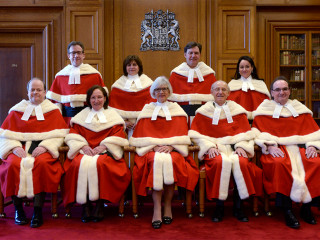Released July 28, 2015 | CanLII
This decision concerns the calculation of prejudgment interest, whether the Court has jurisdiction to make an order pursuant to the trust and assignment provisions of the Insurance Act in the absence of a notice of motion and costs. It was released after the plaintiff, who was catastrophically injured in a motor vehicle accident, was awarded $2,931,006.00 by a jury.
This summary canvasses the Court’s holdings with respect to prejudgment interest.
On what date should the prejudgment interest for past income loss cease to accrue?
The defendants argued that interest should cease accruing on the date in which the plaintiff’s accountant based his loss of income report. The plaintiff argued that interest should cease accruing on the date of judgment, pursuant to s. 128(1) of the Courts of Justice Act, R.S.O. 1990 c. C.43 (the “CJA”). As defence counsel did not provide any basis in law for his position and s. 128(1) of the CJA[1] is clear in stating, “…calculated from the date the cause of action arose to the date of the order,” Toscano Roccamo J., held in favour of the plaintiff’s position.
What is the applicable rate for prejudgment interest on the award for non-pecuniary damages?
Section 128(1) of the CJA creates an entitlement to prejudgment interest. Pursuant to s. 127(1) of the CJA, the interest rate is the same as “…the bank rate at the end of the first day of the last month of the quarter preceding the quarter in which the proceeding was commenced, rounded to the nearest tenth of a percentage point.” This does not apply to the quantification of prejudgment interest on general damages, however. Prejudgment interest on general damages, according to s. 128(2) of the CJA, is determined “by the rules court” and rule 53.10 of the Rules of Civil Procedure provides for an interest rate of 5% per year. Until January 1, 2015, this was the state of the law regarding prejudgement interest on general damages arising out of motor vehicle accidents in Ontario. On that date, however, the Insurance Act, R.S.O., 1990, c. I.8 was amended with the addition of s. 258.3(8.1), which provides for the quantification of prejudgment interest in accordance with s. 127(1) of the CJAm which was 2.5% at the time of this decision.
Finally, s. 53(4) of the Legislation Act, 2006, S.O. 2006, c. 21, Sch. F. must be considered. It provides:
The procedure established by the new or amended Act or regulation shall be followed, with necessary modifications, in proceedings in relation to matters that happened before the replacement or amendment.
The defendants argued that s. 258.3(8.1) of the Insurance Act is retrospective in its application because it is procedural in nature. They relied on the recent decision in Cirillo v. Rizzo, 2015 ONSC 2440, which relied on the Court of Appeal’s decision in Somers v. Fournier, 60 O.R. (3d) 225, in support of their position. The plaintiff argued that the right to prejudgment interest is substantive in nature and Cirillo was wrongly decided because the motions judge misinterpreted Somers, among other arguments. The decision, therefore, turned on whether or not s. 258.3(8.1) of the Insurance Act provides substantive or procedural law. The Court agreed with the plaintiff; Cirillo wrongly interpreted Somers and the provision in question is substantive.
In holding prejudgment interest to be substantive, Toscano Roccamo J. explained, the Court of Appeal’s decision in Somers was underpinned by three main reasons.
- Because litigants are presumptively entitled to prejudgment interest pursuant to s. 128(1) of the CJA and the Court retains the right to vary the rate pursuant to s. 131(1), the right is substantive. Furthermore, the fact that the rate is tied to rates of inflation means it is meant to be a compensatory lever for the benefit of the successful party, rather a punitive one aimed at the unsuccessful party.
- Some of the factors in s. 130(2) of the CJA, which allow the Court to award, vary or deny prejudgment interest, relate to litigants’ conduct and therefore prejudgment interest can be used as a “mechanism to control the progress of litigation.” Unlike costs, which the Court can grant or deny, the Court’s discretion with respect to prejudgment interest relates to the denial or reduction of same, and not the granting of it, which is statutorily born and therefore a substantive right.
- The Court’s comments regarding the procedural nature of the judicially-imposed cap on general damages,[2] (procedural because it was imposed by the Supreme Court in order to avoid excessive and unpredictable awards), only concerned the head of damage itself, not the separate and distinct right of prejudgment interest on top of that head.
In considering s. 258.3(8.1) of the Insurance Act, Toscano Roccamo J. recalled the comments of Minister Sousa on the new provision during Bill 15’s second reading. In her opinion, Minister Sousa’s comments indicated that the “…reason for enacting the provision was to better match the award for prejudgment interest in motor vehicle accidents to the actual loss of interest incurred by a party due to the delay in getting an award for damages (which was generally much less than 5%) and, as a result decrease insurance premiums. The section was not enacted to assist the court in controlling its process.”
Accordingly, the plaintiff was awarded prejudgment interest in an amount representing 5% per annum from May 29, 2007 to April 30, 2015.
[1] Section 258.3(8) of the Insurance Act modifies s. 128 of the Courts of Justice Act with respect to motor vehicle litigation. Pursuant to the former, prejudgment interest in motor vehicle cases does not begin to accrue before the plaintiff gives notice.
[2] Following the trilogy of: Andrews v. Grand & Toy Alberta Ltd., [1978] 2 S.C.R. 229; Thornton v. Prince George School District No. 57, [1978] 2 S.C.R. 267; and Arnold v. Teno, [1978] 2 S.C.R. 287












